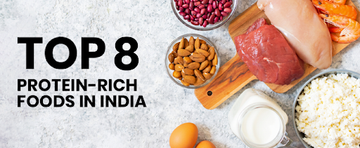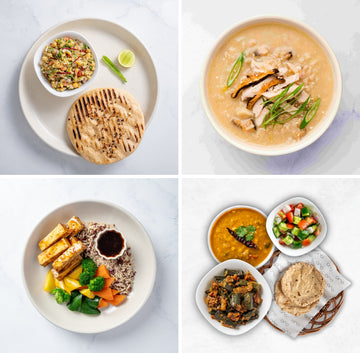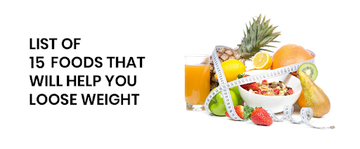Protein is an essential nutrient our bodies need to function correctly. It plays a crucial role in the growth, repair, and maintenance of our tissues and bones. Consuming enough protein-rich diet foods is especially important for people looking to lose weight, gain strength, or maintain overall health. High-protein diet foods can help with weight management by keeping you feeling full and satisfied for extended periods, which can reduce overall calorie consumption. Protein is also vital for muscle growth and repair, which is why it is crucial for athletes and people who are physically active.
In India, many traditional ingredients are naturally high-protein diet foods, making it easy to incorporate this vital nutrient into your diet. Foods such as lentils (dal), chickpeas (chana), paneer, eggs, curd, and cheese, amongst others, are all great sources of protein that are already a part of everyday Indian households. Regularly eating these foods can help you meet your daily protein requirements and support overall fitness.
Here are the top 8 high-protein diet foods that are commonly consumed in India:
- Lentils
- Chickpeas
- Paneer
- Chicken Breast
- Fish
- Peanuts
- Soya Chunks
Lentils (dal)

Lentils, also known as dal, are a staple in Indian cuisine and rich in essential nutrients. One cup of cooked lentils (approximately 200 grams) contains 18 grams of protein & 16 grams of fibre. Lentils are a great source of protein, especially for vegetarians, and they are rich in fibre, which can aid digestion and support weight management. They also contain essential vitamins and minerals, including B vitamins, iron, and magnesium. Additionally, lentils are low in fat and calories, making them an excellent choice for people trying to lose weight & build muscle. Lentils are a high-protein Indian food used in various dishes, including soups, stews, curries, and salads.
Chickpeas (chana)

Chickpeas, also known as chana in India, are a legume high in protein, fibre, and other essential nutrients like iron. One cup of cooked chickpeas (approximately 164 grams) boasts 15 grams of protein and 12 grams of fibre. Chickpeas are a common addition to high-protein diet plans, given their heightened protein content. You can enjoy chickpeas in myriad recipes, including curries, soups, and salads, and they are a fundamental part of many traditional Indian meals. They can also be ground into flour and used to make dishes such as falafel and hummus.
Paneer

There is no way paneer doesn’t come up in a conversation about high-protein diet foods. Paneer is a type of cottage cheese commonly used in Indian cuisine. Making paneer is simple: curdle milk with lemon juice, vinegar, or other acidic substances. One cup of paneer (approximately 144 grams) has 27 grams of protein and 4 grams of carbohydrates. Paneer is evidently a good source of protein, calcium and other essential nutrients. You can use it in various recipes, including several curries like palak paneer and shahi paneer, but also in salads and tortilla wraps.
While paneer is an invaluable protein diet food, it is also high in fat and calories, so you should consume it with restraint as part of a balanced diet.
Chicken Breast

Frequently used in Indian cuisine, chicken is a lean source of protein. The nutritional values of chicken can vary depending on its preparation, but generally, one 85-gram serving of cooked chicken breast contains 26 grams of protein, 3 grams of fat and 0 carbs. Chicken has all the essential amino acids that our bodies need to function accurately, making it a popularly recommended inclusion to protein diet food. Additionally, chicken breast contains less fat than other cuts of chicken, such as the thigh and drumstick, making it a good choice for people trying to lose weight and build muscle.
In India, people commonly use chicken in dishes such as tandoori kebabs and chicken curry. However, chicken is reasonably easy to cook and versatile. Hence you can prepare it in varied ways, such as grilling, baking, and stir-frying. It is important to remember that the cooking method affects the overall intake of nutrients, so make sure to use healthy oils appropriately while preparing chicken. Frequently consuming chicken can help meet your protein macros while providing other essential vitamins and minerals.
Chicken is also the most ordered protein-rich healthy food online, making it easy to find several delivery options that serve good quality & fresh chicken-based meals.
Fish (Salmon or Tuna)

Fish is another excellent source of lean protein commonly consumed in India. In general, 100 grams of cooked fish such as salmon or tuna carries 25 grams of protein, 13 grams of fat and 0 carbs. Besides chicken, we must always include fish in any protein-rich diet foods list.
Fish is an excellent source of protein as it contains many critical amino acids for our body. Fish is also a terrific source of omega-3 fatty acids, which are advantageous for heart and brain health.
In India, fish is easily accessible and hence prevalent in coastal regions. Indians often use it in traditional dishes such as fish curry and fish fry.
It’s worth noting that some types of fish might contain higher levels of mercury and other pollutants; therefore, it’s paramount to be mindful of the consumption of such species of fish. Choosing sustainably sourced fish is always a good idea to avoid overfishing and preserve the balance of the marine ecosystem.
Eggs

Eggs are versatile, nutritious & heavy on protein, making them the most popular protein diet food. One large egg contains six gms of protein, which is about 12% of the daily value based on a 2,000-calorie diet. Besides acting as a significant source of protein, eggs also contain other essential nutrients like vitamin D, choline, and selenium.
Search ‘protein foods in India’, and the first result will always be eggs, owing to their high nutrient values, easy availability and affordability. Eggs are a go-to when looking for high-protein diet foods, and you may cook them in diverse ways, such as omelettes, scrambled eggs, boiled eggs, egg curry & more. You can eat them as is or blend them with other high-protein foods like meats or legumes to create a more balanced meal.
It’s always recommended to consume the whole egg for optimal benefits but remember that egg yolks contain cholesterol. So it’s best to consult a doctor or a nutritionist if you are at risk for heart disease or have high cholesterol before consuming large amounts of eggs.
Peanuts (moongphali)

Peanuts, also known as moongphali in India, are a good source of protein for a few reasons.
First, peanuts are a rich source of plant-based protein, making them an excellent option for vegetarians and vegans. One cup of peanuts (about 146 grams) contains approximately 30 grams of protein, about 60% of the daily value basis of a 2,000-calorie diet. They are also abundant in fibre, which can help with digestion and weight management. Most nutritionists will add a moderated quantity of peanuts to any high-protein vegetarian diet plan.
Peanuts are a versatile, convenient & widely available food. They can be eaten on their own as a snack or used to make dishes like groundnut chutney and peanut-based curries, making them a great ingredient to have on hand. They can also be used as a meat replacement in curries and dishes such as korma and masala to make them more delicious and satisfying without compromising on the protein content.
Finally, peanuts are also a suitable source of beneficial fats, such as monounsaturated and polyunsaturated fats. These fats can help reduce cholesterol levels and decrease the risk of heart disease.
Soya Chunks

Soya chunks, famously called the meal maker, are produced from defatted soy flour, a by-product of soy oil production, and are considered an excellent high-protein Indian food.
Soya chunks are relatively low in fat and calories, making them an excellent choice for people trying to lose or maintain weight. One cup of soya chunks (about 68 grams) carries about 12 grams of protein, which is about 24% of the daily value based on a 2,000-calorie diet. Soya chunks also contain many vital nutrients like fibre, iron, and phosphorus.
Indian cuisine utilises soya chunks in numerous dishes, including curries, stews, and vegetable dishes; they are a widely consumed protein source for vegetarians and vegans. If you want to build a sustainable high protein vegetarian diet plan, Soya Chunks should be the first addition to your menu. Many vegetarian athletes and bodybuilders consume Soya Chunks in a powdered form as a protein supplement. Soy chunks are an affordable alternative to meat and other high-protein diet foods.
It’s worth noting that some people may have a soy allergy or are sensitive to it, in which case, it is best to consult with a doctor or a nutritionist before consuming soya chunks. Additionally, one should consume processed soy products like soya chunks in moderation, as overeating may lead to health issues like digestion problems or hormonal imbalance.
Remember, a high-protein diet does not mean consuming only protein diet food; it’s necessary to have a balanced diet comprising a variety of nutrient-dense foods. Eating different fruits, vegetables, whole grains, and healthy fats in addition to high-protein diet foods is crucial for overall health. A well-balanced diet with an appropriate ratio of all macronutrients will help achieve optimal health and support weight management.
Some people may have specific dietary needs or restrictions and may need to adjust their protein intake accordingly. Excessive protein consumption can sometimes exacerbate health problems, such as kidney damage. Therefore, consuming an appropriate amount of protein and ensuring that it comes from various sources is essential. Additionally, it is important to consult a healthcare provider or a registered nutritionist for personalised advice before changing your diet drastically. If you’re looking for easy and efficient ways to increase your protein intake safely, OJO Life can help with their prompt diet food delivery. You can book an appointment with our nutritionist to make a diet chart suitable for you, and we will prepare the meals and deliver them straight to your door, fresh every morning.
In conclusion, protein diet food is an integral part of a healthy diet, and India offers a variety of delicious and nutritious protein-rich foods. Still, it is necessary to have a wholesome diet consisting of various nutritious foods. Including these foods in your diet can help support weight management, muscle development, and overall health.





